Accounting Principles Report: Financial Reporting and Analysis
VerifiedAdded on 2023/06/10
|23
|5634
|208
Report
AI Summary
This report delves into the core principles of accounting, exploring its purpose within organizations, its role in informed decision-making, and its branches. It examines financial statements such as income statements and balance sheets, and demonstrates the preparation of financial accounts for various business structures. The report emphasizes the significance of technology in modern accounting, including cloud-based systems and mobile applications. Furthermore, it analyzes the application of digital software in preparing financial statements and computing financial ratios. A key component is the creation of a cash budget, along with an examination of associated problems, solutions, and organizational impacts. Finally, the report assesses the advantages and disadvantages of budgeting, financial planning, and organizational management, and addresses ethical, regulatory, and compliance issues that may pose risks to the organization.
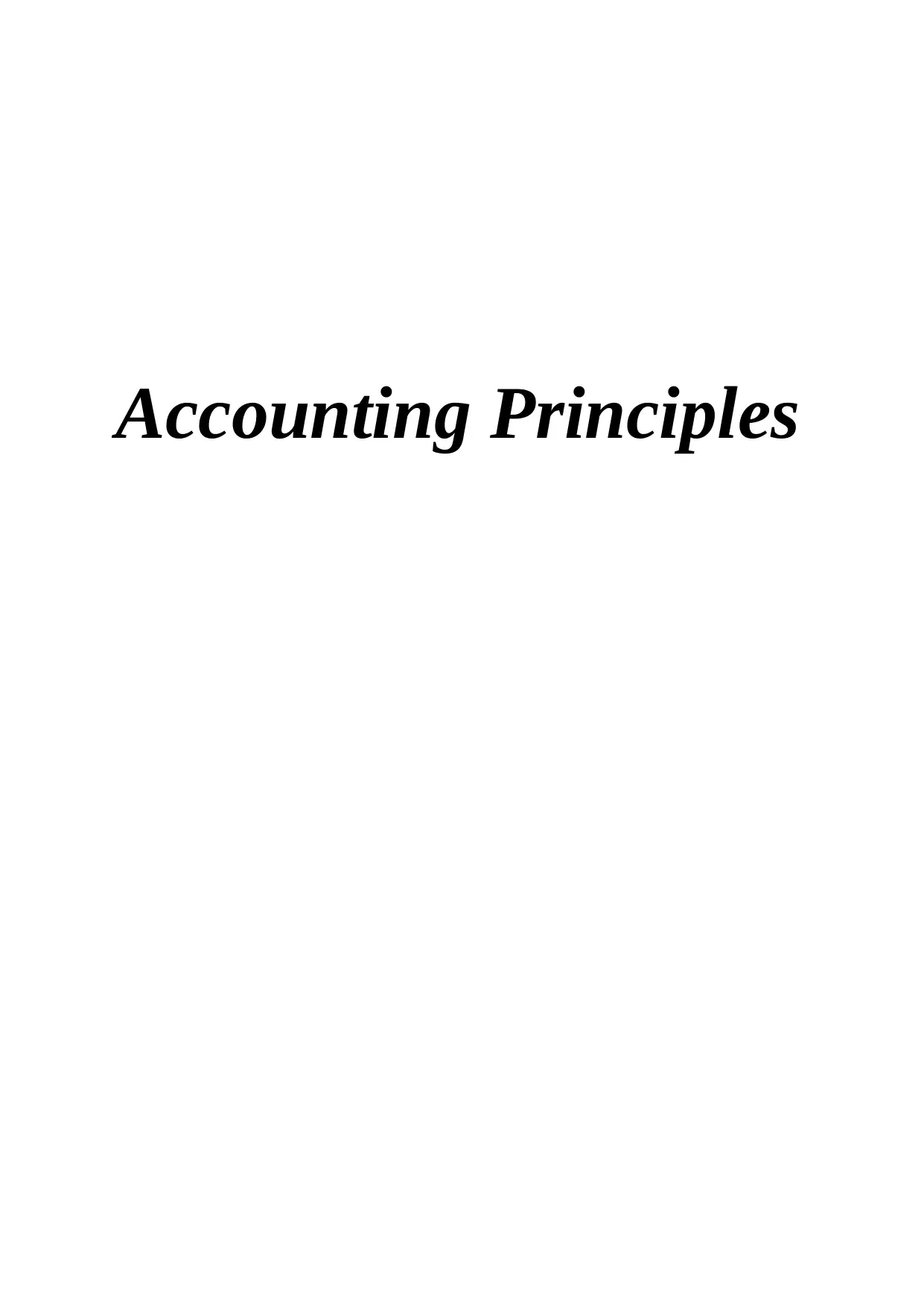
Accounting Principles
Paraphrase This Document
Need a fresh take? Get an instant paraphrase of this document with our AI Paraphraser
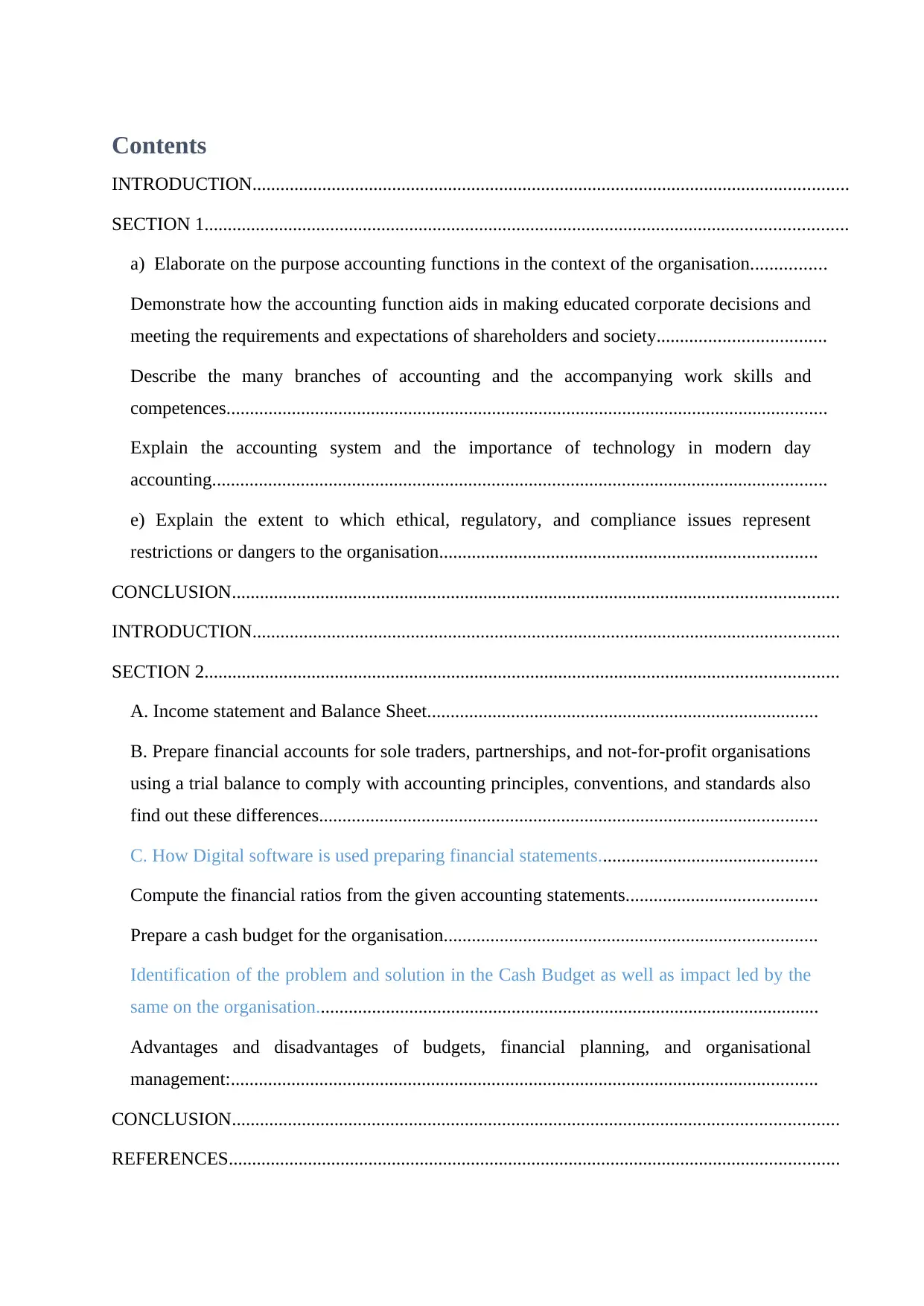
Contents
INTRODUCTION................................................................................................................................
SECTION 1..........................................................................................................................................
a) Elaborate on the purpose accounting functions in the context of the organisation................
Demonstrate how the accounting function aids in making educated corporate decisions and
meeting the requirements and expectations of shareholders and society....................................
Describe the many branches of accounting and the accompanying work skills and
competences.................................................................................................................................
Explain the accounting system and the importance of technology in modern day
accounting....................................................................................................................................
e) Explain the extent to which ethical, regulatory, and compliance issues represent
restrictions or dangers to the organisation.................................................................................
CONCLUSION..................................................................................................................................
INTRODUCTION..............................................................................................................................
SECTION 2........................................................................................................................................
A. Income statement and Balance Sheet....................................................................................
B. Prepare financial accounts for sole traders, partnerships, and not-for-profit organisations
using a trial balance to comply with accounting principles, conventions, and standards also
find out these differences...........................................................................................................
C. How Digital software is used preparing financial statements...............................................
Compute the financial ratios from the given accounting statements.........................................
Prepare a cash budget for the organisation................................................................................
Identification of the problem and solution in the Cash Budget as well as impact led by the
same on the organisation............................................................................................................
Advantages and disadvantages of budgets, financial planning, and organisational
management:..............................................................................................................................
CONCLUSION..................................................................................................................................
REFERENCES...................................................................................................................................
INTRODUCTION................................................................................................................................
SECTION 1..........................................................................................................................................
a) Elaborate on the purpose accounting functions in the context of the organisation................
Demonstrate how the accounting function aids in making educated corporate decisions and
meeting the requirements and expectations of shareholders and society....................................
Describe the many branches of accounting and the accompanying work skills and
competences.................................................................................................................................
Explain the accounting system and the importance of technology in modern day
accounting....................................................................................................................................
e) Explain the extent to which ethical, regulatory, and compliance issues represent
restrictions or dangers to the organisation.................................................................................
CONCLUSION..................................................................................................................................
INTRODUCTION..............................................................................................................................
SECTION 2........................................................................................................................................
A. Income statement and Balance Sheet....................................................................................
B. Prepare financial accounts for sole traders, partnerships, and not-for-profit organisations
using a trial balance to comply with accounting principles, conventions, and standards also
find out these differences...........................................................................................................
C. How Digital software is used preparing financial statements...............................................
Compute the financial ratios from the given accounting statements.........................................
Prepare a cash budget for the organisation................................................................................
Identification of the problem and solution in the Cash Budget as well as impact led by the
same on the organisation............................................................................................................
Advantages and disadvantages of budgets, financial planning, and organisational
management:..............................................................................................................................
CONCLUSION..................................................................................................................................
REFERENCES...................................................................................................................................

⊘ This is a preview!⊘
Do you want full access?
Subscribe today to unlock all pages.

Trusted by 1+ million students worldwide
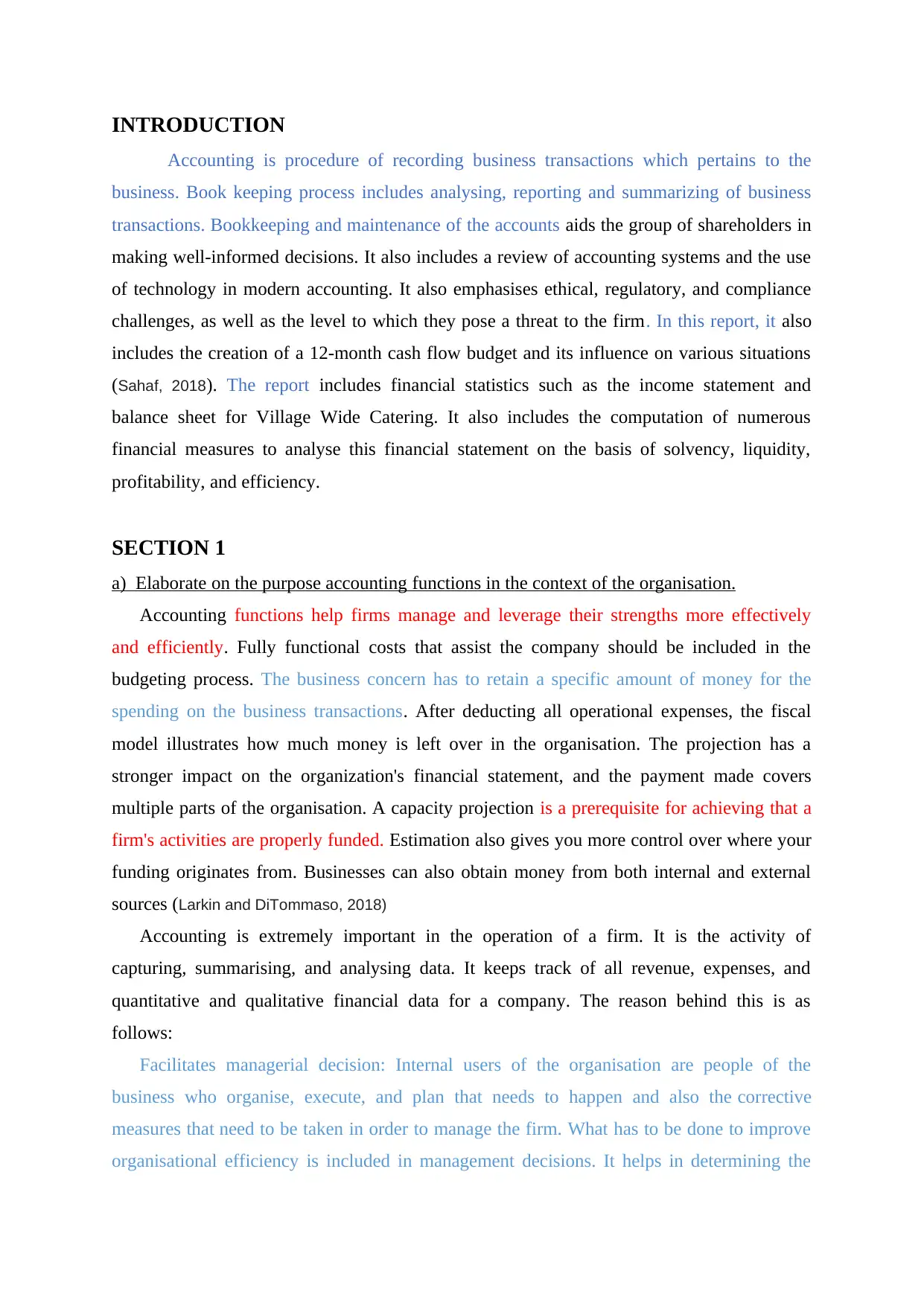
INTRODUCTION
Accounting is procedure of recording business transactions which pertains to the
business. Book keeping process includes analysing, reporting and summarizing of business
transactions. Bookkeeping and maintenance of the accounts aids the group of shareholders in
making well-informed decisions. It also includes a review of accounting systems and the use
of technology in modern accounting. It also emphasises ethical, regulatory, and compliance
challenges, as well as the level to which they pose a threat to the firm. In this report, it also
includes the creation of a 12-month cash flow budget and its influence on various situations
(Sahaf, 2018). The report includes financial statistics such as the income statement and
balance sheet for Village Wide Catering. It also includes the computation of numerous
financial measures to analyse this financial statement on the basis of solvency, liquidity,
profitability, and efficiency.
SECTION 1
a) Elaborate on the purpose accounting functions in the context of the organisation.
Accounting functions help firms manage and leverage their strengths more effectively
and efficiently. Fully functional costs that assist the company should be included in the
budgeting process. The business concern has to retain a specific amount of money for the
spending on the business transactions. After deducting all operational expenses, the fiscal
model illustrates how much money is left over in the organisation. The projection has a
stronger impact on the organization's financial statement, and the payment made covers
multiple parts of the organisation. A capacity projection is a prerequisite for achieving that a
firm's activities are properly funded. Estimation also gives you more control over where your
funding originates from. Businesses can also obtain money from both internal and external
sources (Larkin and DiTommaso, 2018)
Accounting is extremely important in the operation of a firm. It is the activity of
capturing, summarising, and analysing data. It keeps track of all revenue, expenses, and
quantitative and qualitative financial data for a company. The reason behind this is as
follows:
Facilitates managerial decision: Internal users of the organisation are people of the
business who organise, execute, and plan that needs to happen and also the corrective
measures that need to be taken in order to manage the firm. What has to be done to improve
organisational efficiency is included in management decisions. It helps in determining the
Accounting is procedure of recording business transactions which pertains to the
business. Book keeping process includes analysing, reporting and summarizing of business
transactions. Bookkeeping and maintenance of the accounts aids the group of shareholders in
making well-informed decisions. It also includes a review of accounting systems and the use
of technology in modern accounting. It also emphasises ethical, regulatory, and compliance
challenges, as well as the level to which they pose a threat to the firm. In this report, it also
includes the creation of a 12-month cash flow budget and its influence on various situations
(Sahaf, 2018). The report includes financial statistics such as the income statement and
balance sheet for Village Wide Catering. It also includes the computation of numerous
financial measures to analyse this financial statement on the basis of solvency, liquidity,
profitability, and efficiency.
SECTION 1
a) Elaborate on the purpose accounting functions in the context of the organisation.
Accounting functions help firms manage and leverage their strengths more effectively
and efficiently. Fully functional costs that assist the company should be included in the
budgeting process. The business concern has to retain a specific amount of money for the
spending on the business transactions. After deducting all operational expenses, the fiscal
model illustrates how much money is left over in the organisation. The projection has a
stronger impact on the organization's financial statement, and the payment made covers
multiple parts of the organisation. A capacity projection is a prerequisite for achieving that a
firm's activities are properly funded. Estimation also gives you more control over where your
funding originates from. Businesses can also obtain money from both internal and external
sources (Larkin and DiTommaso, 2018)
Accounting is extremely important in the operation of a firm. It is the activity of
capturing, summarising, and analysing data. It keeps track of all revenue, expenses, and
quantitative and qualitative financial data for a company. The reason behind this is as
follows:
Facilitates managerial decision: Internal users of the organisation are people of the
business who organise, execute, and plan that needs to happen and also the corrective
measures that need to be taken in order to manage the firm. What has to be done to improve
organisational efficiency is included in management decisions. It helps in determining the
Paraphrase This Document
Need a fresh take? Get an instant paraphrase of this document with our AI Paraphraser
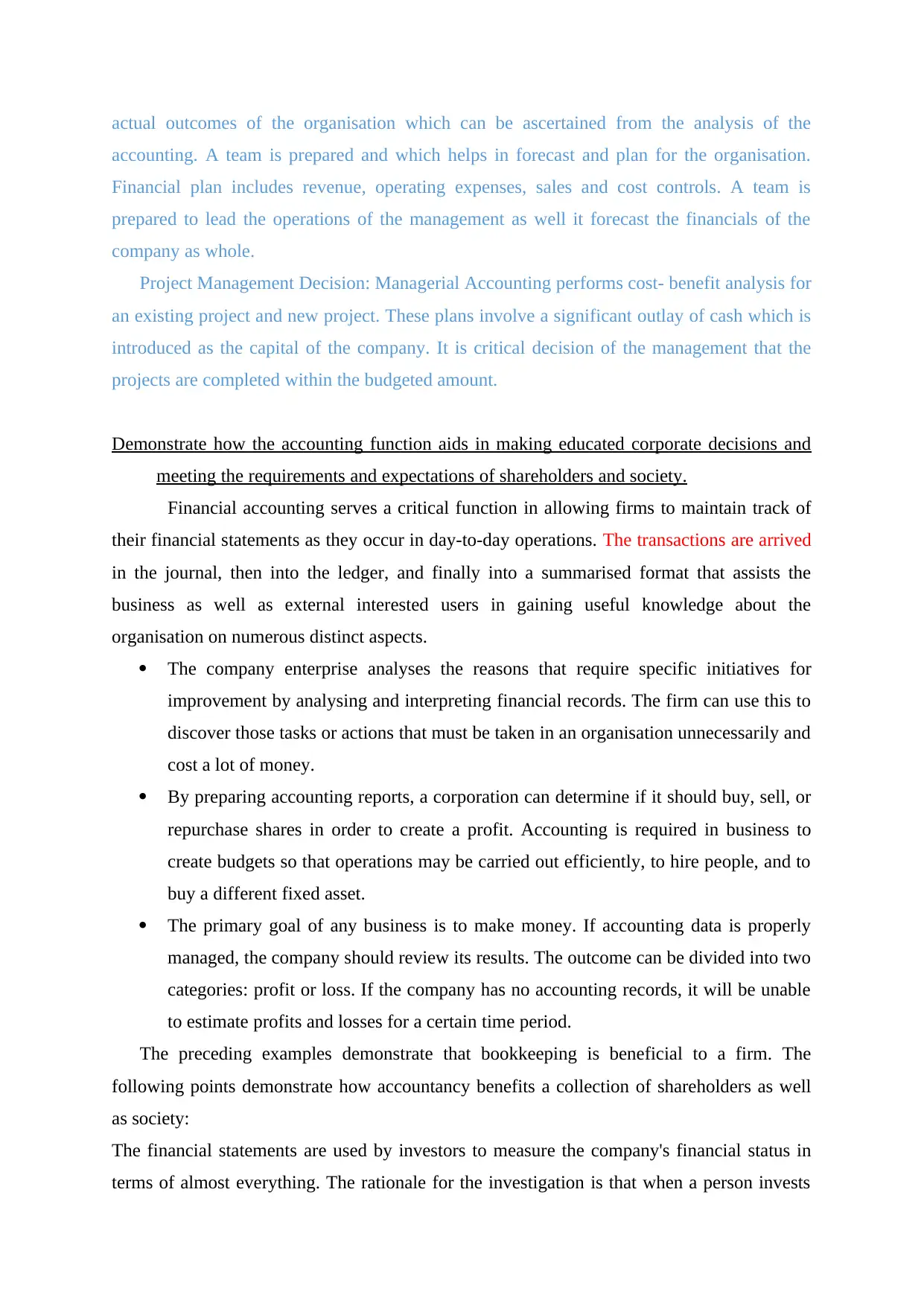
actual outcomes of the organisation which can be ascertained from the analysis of the
accounting. A team is prepared and which helps in forecast and plan for the organisation.
Financial plan includes revenue, operating expenses, sales and cost controls. A team is
prepared to lead the operations of the management as well it forecast the financials of the
company as whole.
Project Management Decision: Managerial Accounting performs cost- benefit analysis for
an existing project and new project. These plans involve a significant outlay of cash which is
introduced as the capital of the company. It is critical decision of the management that the
projects are completed within the budgeted amount.
Demonstrate how the accounting function aids in making educated corporate decisions and
meeting the requirements and expectations of shareholders and society.
Financial accounting serves a critical function in allowing firms to maintain track of
their financial statements as they occur in day-to-day operations. The transactions are arrived
in the journal, then into the ledger, and finally into a summarised format that assists the
business as well as external interested users in gaining useful knowledge about the
organisation on numerous distinct aspects.
The company enterprise analyses the reasons that require specific initiatives for
improvement by analysing and interpreting financial records. The firm can use this to
discover those tasks or actions that must be taken in an organisation unnecessarily and
cost a lot of money.
By preparing accounting reports, a corporation can determine if it should buy, sell, or
repurchase shares in order to create a profit. Accounting is required in business to
create budgets so that operations may be carried out efficiently, to hire people, and to
buy a different fixed asset.
The primary goal of any business is to make money. If accounting data is properly
managed, the company should review its results. The outcome can be divided into two
categories: profit or loss. If the company has no accounting records, it will be unable
to estimate profits and losses for a certain time period.
The preceding examples demonstrate that bookkeeping is beneficial to a firm. The
following points demonstrate how accountancy benefits a collection of shareholders as well
as society:
The financial statements are used by investors to measure the company's financial status in
terms of almost everything. The rationale for the investigation is that when a person invests
accounting. A team is prepared and which helps in forecast and plan for the organisation.
Financial plan includes revenue, operating expenses, sales and cost controls. A team is
prepared to lead the operations of the management as well it forecast the financials of the
company as whole.
Project Management Decision: Managerial Accounting performs cost- benefit analysis for
an existing project and new project. These plans involve a significant outlay of cash which is
introduced as the capital of the company. It is critical decision of the management that the
projects are completed within the budgeted amount.
Demonstrate how the accounting function aids in making educated corporate decisions and
meeting the requirements and expectations of shareholders and society.
Financial accounting serves a critical function in allowing firms to maintain track of
their financial statements as they occur in day-to-day operations. The transactions are arrived
in the journal, then into the ledger, and finally into a summarised format that assists the
business as well as external interested users in gaining useful knowledge about the
organisation on numerous distinct aspects.
The company enterprise analyses the reasons that require specific initiatives for
improvement by analysing and interpreting financial records. The firm can use this to
discover those tasks or actions that must be taken in an organisation unnecessarily and
cost a lot of money.
By preparing accounting reports, a corporation can determine if it should buy, sell, or
repurchase shares in order to create a profit. Accounting is required in business to
create budgets so that operations may be carried out efficiently, to hire people, and to
buy a different fixed asset.
The primary goal of any business is to make money. If accounting data is properly
managed, the company should review its results. The outcome can be divided into two
categories: profit or loss. If the company has no accounting records, it will be unable
to estimate profits and losses for a certain time period.
The preceding examples demonstrate that bookkeeping is beneficial to a firm. The
following points demonstrate how accountancy benefits a collection of shareholders as well
as society:
The financial statements are used by investors to measure the company's financial status in
terms of almost everything. The rationale for the investigation is that when a person invests
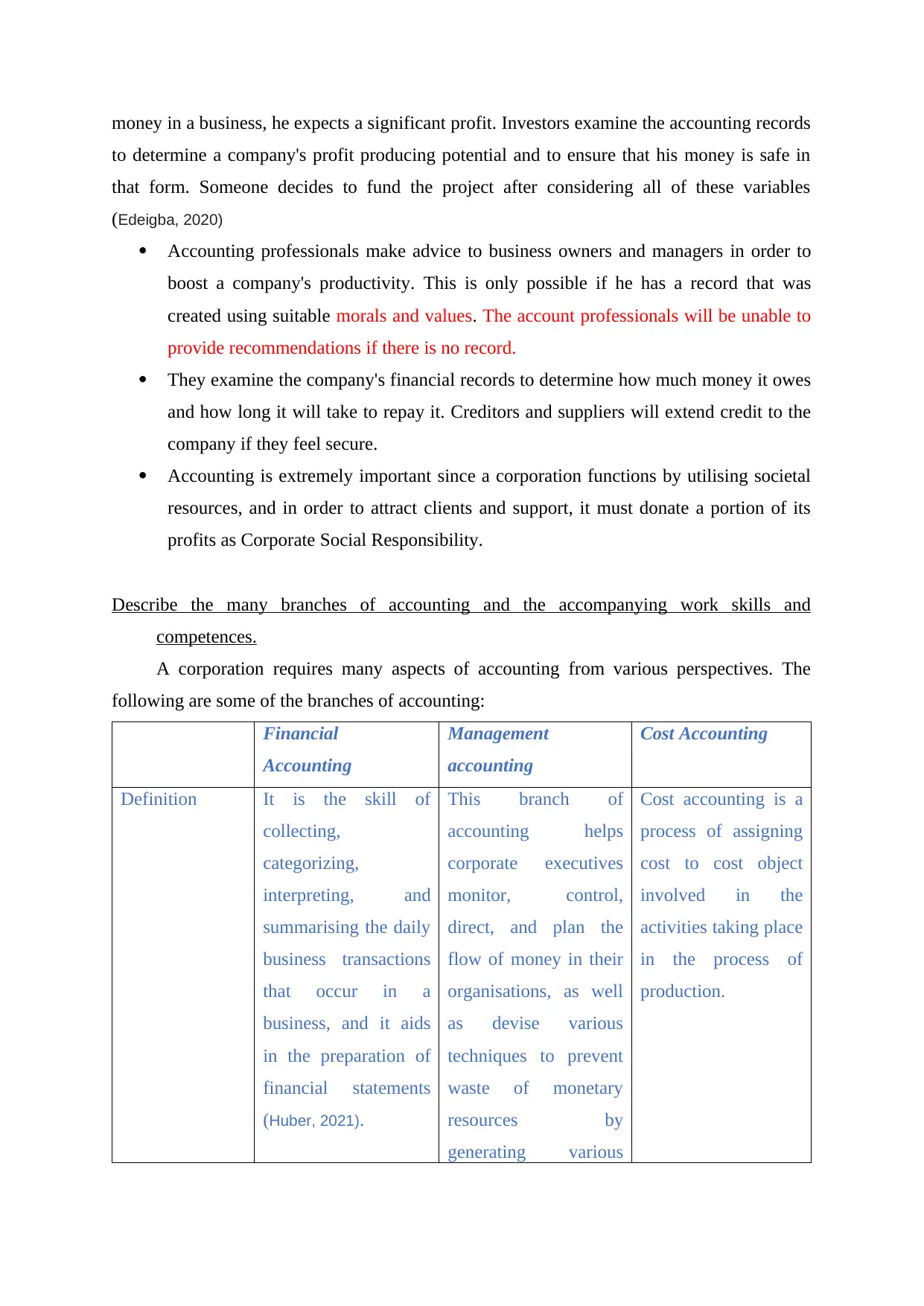
money in a business, he expects a significant profit. Investors examine the accounting records
to determine a company's profit producing potential and to ensure that his money is safe in
that form. Someone decides to fund the project after considering all of these variables
(Edeigba, 2020)
Accounting professionals make advice to business owners and managers in order to
boost a company's productivity. This is only possible if he has a record that was
created using suitable morals and values. The account professionals will be unable to
provide recommendations if there is no record.
They examine the company's financial records to determine how much money it owes
and how long it will take to repay it. Creditors and suppliers will extend credit to the
company if they feel secure.
Accounting is extremely important since a corporation functions by utilising societal
resources, and in order to attract clients and support, it must donate a portion of its
profits as Corporate Social Responsibility.
Describe the many branches of accounting and the accompanying work skills and
competences.
A corporation requires many aspects of accounting from various perspectives. The
following are some of the branches of accounting:
Financial
Accounting
Management
accounting
Cost Accounting
Definition It is the skill of
collecting,
categorizing,
interpreting, and
summarising the daily
business transactions
that occur in a
business, and it aids
in the preparation of
financial statements
(Huber, 2021).
This branch of
accounting helps
corporate executives
monitor, control,
direct, and plan the
flow of money in their
organisations, as well
as devise various
techniques to prevent
waste of monetary
resources by
generating various
Cost accounting is a
process of assigning
cost to cost object
involved in the
activities taking place
in the process of
production.
to determine a company's profit producing potential and to ensure that his money is safe in
that form. Someone decides to fund the project after considering all of these variables
(Edeigba, 2020)
Accounting professionals make advice to business owners and managers in order to
boost a company's productivity. This is only possible if he has a record that was
created using suitable morals and values. The account professionals will be unable to
provide recommendations if there is no record.
They examine the company's financial records to determine how much money it owes
and how long it will take to repay it. Creditors and suppliers will extend credit to the
company if they feel secure.
Accounting is extremely important since a corporation functions by utilising societal
resources, and in order to attract clients and support, it must donate a portion of its
profits as Corporate Social Responsibility.
Describe the many branches of accounting and the accompanying work skills and
competences.
A corporation requires many aspects of accounting from various perspectives. The
following are some of the branches of accounting:
Financial
Accounting
Management
accounting
Cost Accounting
Definition It is the skill of
collecting,
categorizing,
interpreting, and
summarising the daily
business transactions
that occur in a
business, and it aids
in the preparation of
financial statements
(Huber, 2021).
This branch of
accounting helps
corporate executives
monitor, control,
direct, and plan the
flow of money in their
organisations, as well
as devise various
techniques to prevent
waste of monetary
resources by
generating various
Cost accounting is a
process of assigning
cost to cost object
involved in the
activities taking place
in the process of
production.
⊘ This is a preview!⊘
Do you want full access?
Subscribe today to unlock all pages.

Trusted by 1+ million students worldwide
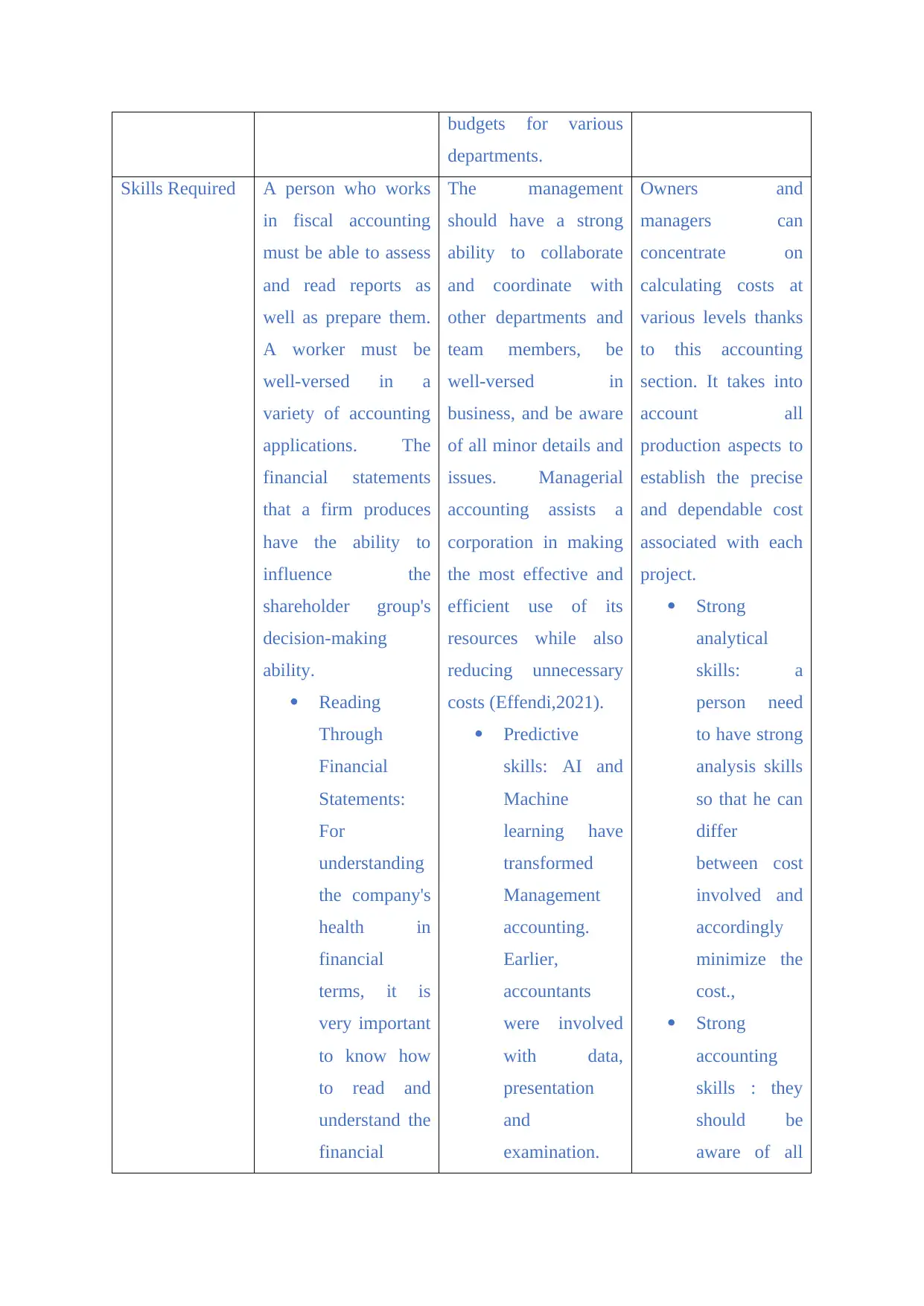
budgets for various
departments.
Skills Required A person who works
in fiscal accounting
must be able to assess
and read reports as
well as prepare them.
A worker must be
well-versed in a
variety of accounting
applications. The
financial statements
that a firm produces
have the ability to
influence the
shareholder group's
decision-making
ability.
Reading
Through
Financial
Statements:
For
understanding
the company's
health in
financial
terms, it is
very important
to know how
to read and
understand the
financial
The management
should have a strong
ability to collaborate
and coordinate with
other departments and
team members, be
well-versed in
business, and be aware
of all minor details and
issues. Managerial
accounting assists a
corporation in making
the most effective and
efficient use of its
resources while also
reducing unnecessary
costs (Effendi,2021).
Predictive
skills: AI and
Machine
learning have
transformed
Management
accounting.
Earlier,
accountants
were involved
with data,
presentation
and
examination.
Owners and
managers can
concentrate on
calculating costs at
various levels thanks
to this accounting
section. It takes into
account all
production aspects to
establish the precise
and dependable cost
associated with each
project.
Strong
analytical
skills: a
person need
to have strong
analysis skills
so that he can
differ
between cost
involved and
accordingly
minimize the
cost.,
Strong
accounting
skills : they
should be
aware of all
departments.
Skills Required A person who works
in fiscal accounting
must be able to assess
and read reports as
well as prepare them.
A worker must be
well-versed in a
variety of accounting
applications. The
financial statements
that a firm produces
have the ability to
influence the
shareholder group's
decision-making
ability.
Reading
Through
Financial
Statements:
For
understanding
the company's
health in
financial
terms, it is
very important
to know how
to read and
understand the
financial
The management
should have a strong
ability to collaborate
and coordinate with
other departments and
team members, be
well-versed in
business, and be aware
of all minor details and
issues. Managerial
accounting assists a
corporation in making
the most effective and
efficient use of its
resources while also
reducing unnecessary
costs (Effendi,2021).
Predictive
skills: AI and
Machine
learning have
transformed
Management
accounting.
Earlier,
accountants
were involved
with data,
presentation
and
examination.
Owners and
managers can
concentrate on
calculating costs at
various levels thanks
to this accounting
section. It takes into
account all
production aspects to
establish the precise
and dependable cost
associated with each
project.
Strong
analytical
skills: a
person need
to have strong
analysis skills
so that he can
differ
between cost
involved and
accordingly
minimize the
cost.,
Strong
accounting
skills : they
should be
aware of all
Paraphrase This Document
Need a fresh take? Get an instant paraphrase of this document with our AI Paraphraser
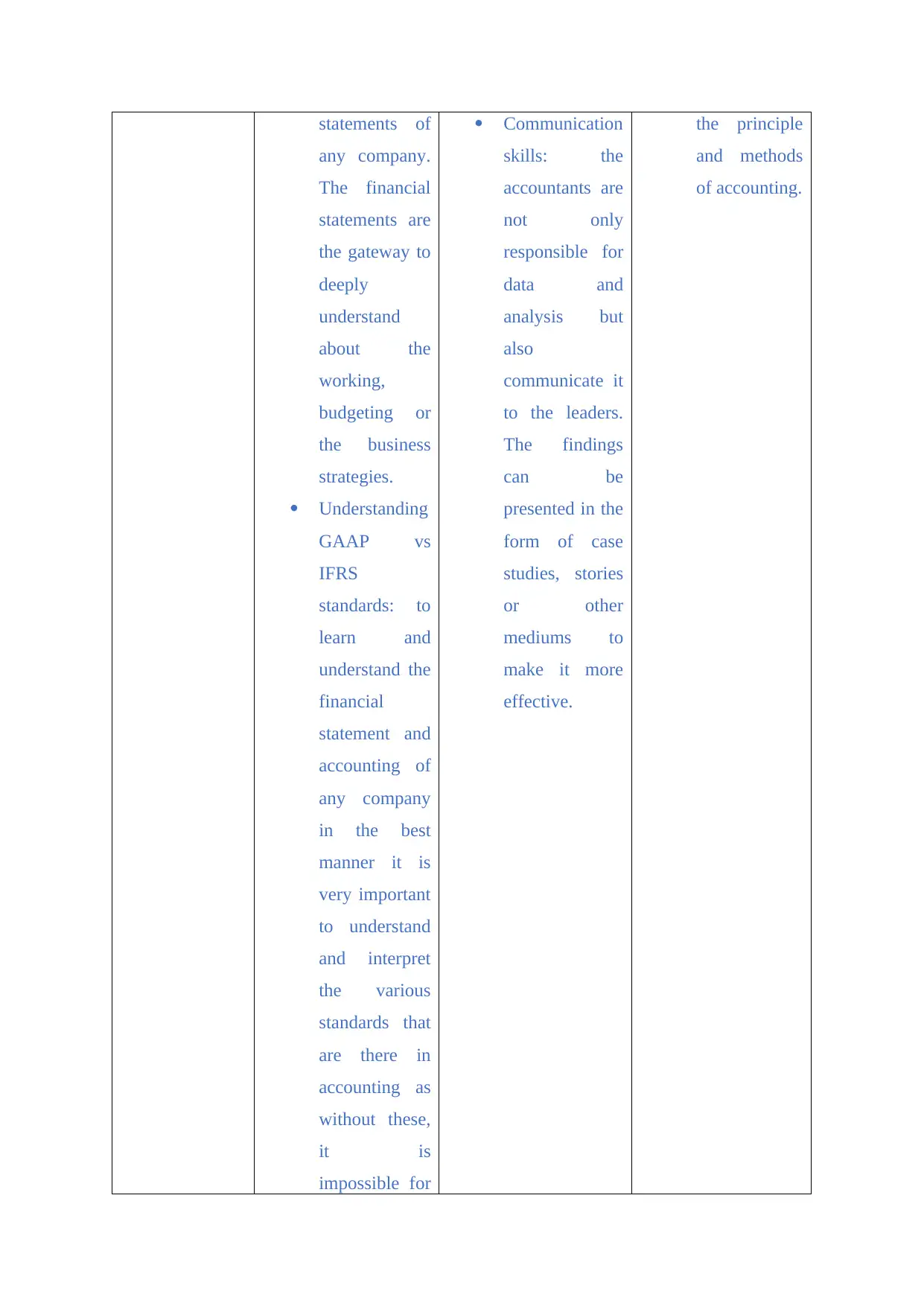
statements of
any company.
The financial
statements are
the gateway to
deeply
understand
about the
working,
budgeting or
the business
strategies.
Understanding
GAAP vs
IFRS
standards: to
learn and
understand the
financial
statement and
accounting of
any company
in the best
manner it is
very important
to understand
and interpret
the various
standards that
are there in
accounting as
without these,
it is
impossible for
Communication
skills: the
accountants are
not only
responsible for
data and
analysis but
also
communicate it
to the leaders.
The findings
can be
presented in the
form of case
studies, stories
or other
mediums to
make it more
effective.
the principle
and methods
of accounting.
any company.
The financial
statements are
the gateway to
deeply
understand
about the
working,
budgeting or
the business
strategies.
Understanding
GAAP vs
IFRS
standards: to
learn and
understand the
financial
statement and
accounting of
any company
in the best
manner it is
very important
to understand
and interpret
the various
standards that
are there in
accounting as
without these,
it is
impossible for
Communication
skills: the
accountants are
not only
responsible for
data and
analysis but
also
communicate it
to the leaders.
The findings
can be
presented in the
form of case
studies, stories
or other
mediums to
make it more
effective.
the principle
and methods
of accounting.
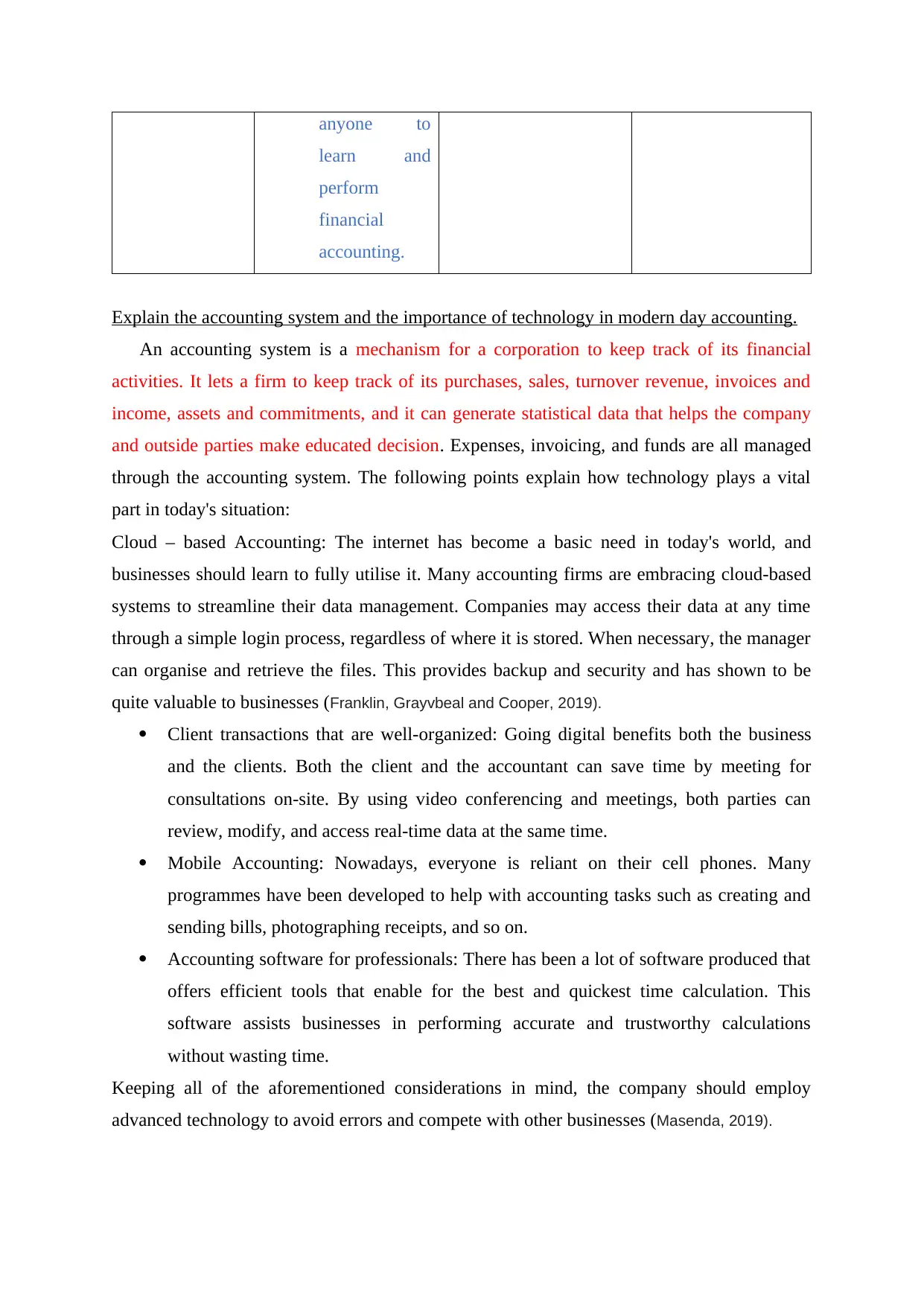
anyone to
learn and
perform
financial
accounting.
Explain the accounting system and the importance of technology in modern day accounting.
An accounting system is a mechanism for a corporation to keep track of its financial
activities. It lets a firm to keep track of its purchases, sales, turnover revenue, invoices and
income, assets and commitments, and it can generate statistical data that helps the company
and outside parties make educated decision. Expenses, invoicing, and funds are all managed
through the accounting system. The following points explain how technology plays a vital
part in today's situation:
Cloud – based Accounting: The internet has become a basic need in today's world, and
businesses should learn to fully utilise it. Many accounting firms are embracing cloud-based
systems to streamline their data management. Companies may access their data at any time
through a simple login process, regardless of where it is stored. When necessary, the manager
can organise and retrieve the files. This provides backup and security and has shown to be
quite valuable to businesses (Franklin, Grayvbeal and Cooper, 2019).
Client transactions that are well-organized: Going digital benefits both the business
and the clients. Both the client and the accountant can save time by meeting for
consultations on-site. By using video conferencing and meetings, both parties can
review, modify, and access real-time data at the same time.
Mobile Accounting: Nowadays, everyone is reliant on their cell phones. Many
programmes have been developed to help with accounting tasks such as creating and
sending bills, photographing receipts, and so on.
Accounting software for professionals: There has been a lot of software produced that
offers efficient tools that enable for the best and quickest time calculation. This
software assists businesses in performing accurate and trustworthy calculations
without wasting time.
Keeping all of the aforementioned considerations in mind, the company should employ
advanced technology to avoid errors and compete with other businesses (Masenda, 2019).
learn and
perform
financial
accounting.
Explain the accounting system and the importance of technology in modern day accounting.
An accounting system is a mechanism for a corporation to keep track of its financial
activities. It lets a firm to keep track of its purchases, sales, turnover revenue, invoices and
income, assets and commitments, and it can generate statistical data that helps the company
and outside parties make educated decision. Expenses, invoicing, and funds are all managed
through the accounting system. The following points explain how technology plays a vital
part in today's situation:
Cloud – based Accounting: The internet has become a basic need in today's world, and
businesses should learn to fully utilise it. Many accounting firms are embracing cloud-based
systems to streamline their data management. Companies may access their data at any time
through a simple login process, regardless of where it is stored. When necessary, the manager
can organise and retrieve the files. This provides backup and security and has shown to be
quite valuable to businesses (Franklin, Grayvbeal and Cooper, 2019).
Client transactions that are well-organized: Going digital benefits both the business
and the clients. Both the client and the accountant can save time by meeting for
consultations on-site. By using video conferencing and meetings, both parties can
review, modify, and access real-time data at the same time.
Mobile Accounting: Nowadays, everyone is reliant on their cell phones. Many
programmes have been developed to help with accounting tasks such as creating and
sending bills, photographing receipts, and so on.
Accounting software for professionals: There has been a lot of software produced that
offers efficient tools that enable for the best and quickest time calculation. This
software assists businesses in performing accurate and trustworthy calculations
without wasting time.
Keeping all of the aforementioned considerations in mind, the company should employ
advanced technology to avoid errors and compete with other businesses (Masenda, 2019).
⊘ This is a preview!⊘
Do you want full access?
Subscribe today to unlock all pages.

Trusted by 1+ million students worldwide
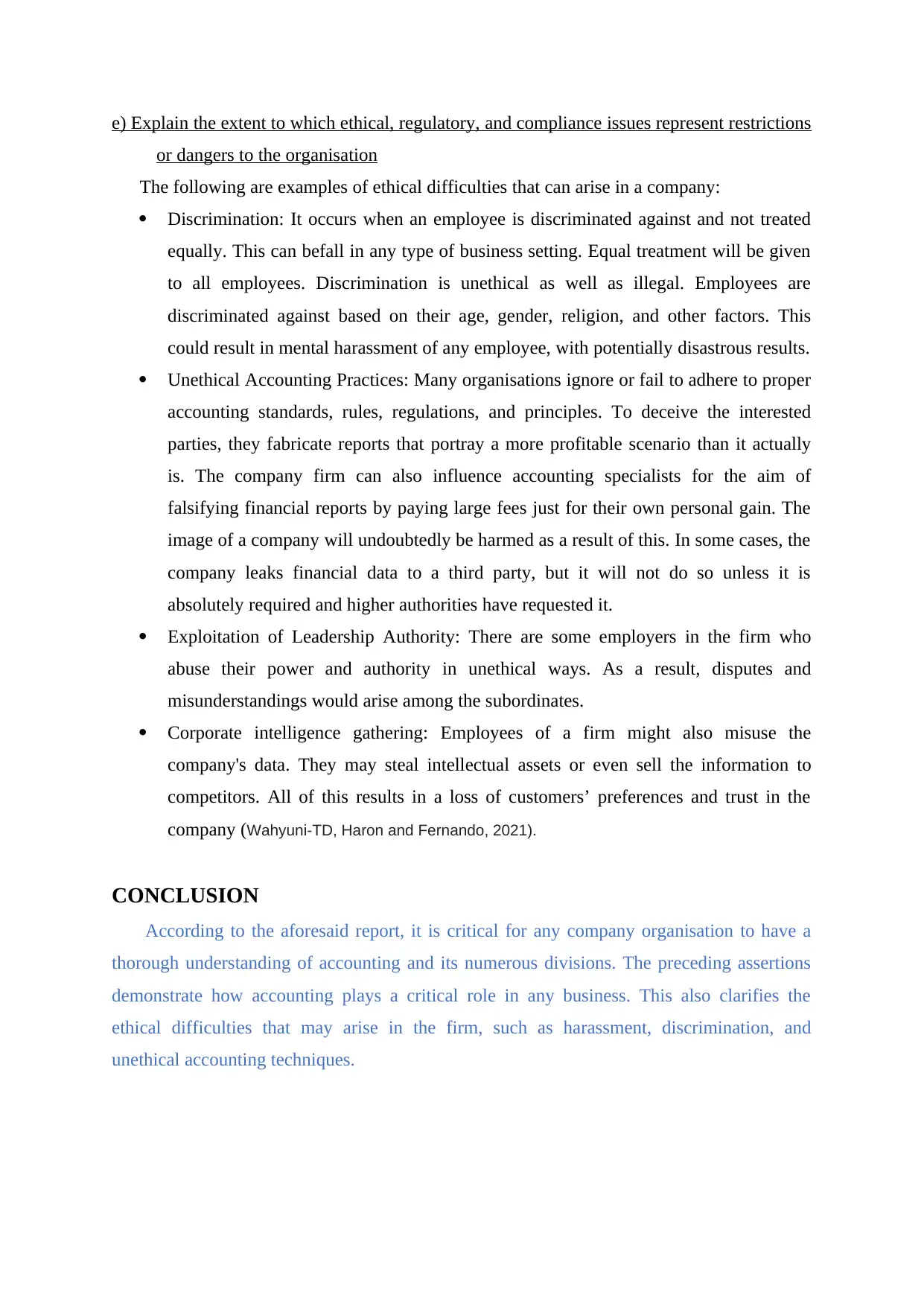
e) Explain the extent to which ethical, regulatory, and compliance issues represent restrictions
or dangers to the organisation
The following are examples of ethical difficulties that can arise in a company:
Discrimination: It occurs when an employee is discriminated against and not treated
equally. This can befall in any type of business setting. Equal treatment will be given
to all employees. Discrimination is unethical as well as illegal. Employees are
discriminated against based on their age, gender, religion, and other factors. This
could result in mental harassment of any employee, with potentially disastrous results.
Unethical Accounting Practices: Many organisations ignore or fail to adhere to proper
accounting standards, rules, regulations, and principles. To deceive the interested
parties, they fabricate reports that portray a more profitable scenario than it actually
is. The company firm can also influence accounting specialists for the aim of
falsifying financial reports by paying large fees just for their own personal gain. The
image of a company will undoubtedly be harmed as a result of this. In some cases, the
company leaks financial data to a third party, but it will not do so unless it is
absolutely required and higher authorities have requested it.
Exploitation of Leadership Authority: There are some employers in the firm who
abuse their power and authority in unethical ways. As a result, disputes and
misunderstandings would arise among the subordinates.
Corporate intelligence gathering: Employees of a firm might also misuse the
company's data. They may steal intellectual assets or even sell the information to
competitors. All of this results in a loss of customers’ preferences and trust in the
company (Wahyuni-TD, Haron and Fernando, 2021).
CONCLUSION
According to the aforesaid report, it is critical for any company organisation to have a
thorough understanding of accounting and its numerous divisions. The preceding assertions
demonstrate how accounting plays a critical role in any business. This also clarifies the
ethical difficulties that may arise in the firm, such as harassment, discrimination, and
unethical accounting techniques.
or dangers to the organisation
The following are examples of ethical difficulties that can arise in a company:
Discrimination: It occurs when an employee is discriminated against and not treated
equally. This can befall in any type of business setting. Equal treatment will be given
to all employees. Discrimination is unethical as well as illegal. Employees are
discriminated against based on their age, gender, religion, and other factors. This
could result in mental harassment of any employee, with potentially disastrous results.
Unethical Accounting Practices: Many organisations ignore or fail to adhere to proper
accounting standards, rules, regulations, and principles. To deceive the interested
parties, they fabricate reports that portray a more profitable scenario than it actually
is. The company firm can also influence accounting specialists for the aim of
falsifying financial reports by paying large fees just for their own personal gain. The
image of a company will undoubtedly be harmed as a result of this. In some cases, the
company leaks financial data to a third party, but it will not do so unless it is
absolutely required and higher authorities have requested it.
Exploitation of Leadership Authority: There are some employers in the firm who
abuse their power and authority in unethical ways. As a result, disputes and
misunderstandings would arise among the subordinates.
Corporate intelligence gathering: Employees of a firm might also misuse the
company's data. They may steal intellectual assets or even sell the information to
competitors. All of this results in a loss of customers’ preferences and trust in the
company (Wahyuni-TD, Haron and Fernando, 2021).
CONCLUSION
According to the aforesaid report, it is critical for any company organisation to have a
thorough understanding of accounting and its numerous divisions. The preceding assertions
demonstrate how accounting plays a critical role in any business. This also clarifies the
ethical difficulties that may arise in the firm, such as harassment, discrimination, and
unethical accounting techniques.
Paraphrase This Document
Need a fresh take? Get an instant paraphrase of this document with our AI Paraphraser
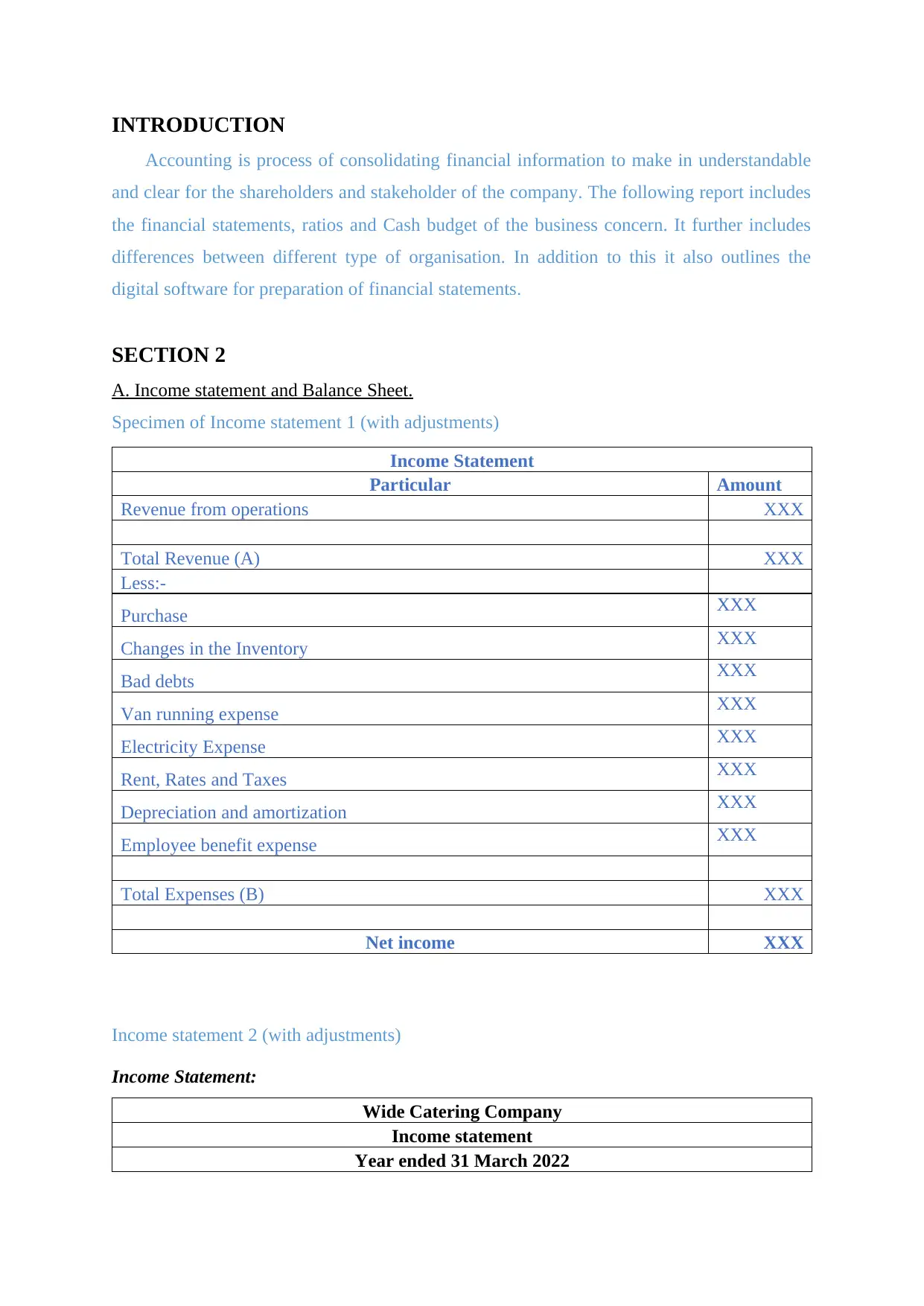
INTRODUCTION
Accounting is process of consolidating financial information to make in understandable
and clear for the shareholders and stakeholder of the company. The following report includes
the financial statements, ratios and Cash budget of the business concern. It further includes
differences between different type of organisation. In addition to this it also outlines the
digital software for preparation of financial statements.
SECTION 2
A. Income statement and Balance Sheet.
Specimen of Income statement 1 (with adjustments)
Income Statement
Particular Amount
Revenue from operations XXX
Total Revenue (A) XXX
Less:-
Purchase XXX
Changes in the Inventory XXX
Bad debts XXX
Van running expense XXX
Electricity Expense XXX
Rent, Rates and Taxes XXX
Depreciation and amortization XXX
Employee benefit expense XXX
Total Expenses (B) XXX
Net income XXX
Income statement 2 (with adjustments)
Income Statement:
Wide Catering Company
Income statement
Year ended 31 March 2022
Accounting is process of consolidating financial information to make in understandable
and clear for the shareholders and stakeholder of the company. The following report includes
the financial statements, ratios and Cash budget of the business concern. It further includes
differences between different type of organisation. In addition to this it also outlines the
digital software for preparation of financial statements.
SECTION 2
A. Income statement and Balance Sheet.
Specimen of Income statement 1 (with adjustments)
Income Statement
Particular Amount
Revenue from operations XXX
Total Revenue (A) XXX
Less:-
Purchase XXX
Changes in the Inventory XXX
Bad debts XXX
Van running expense XXX
Electricity Expense XXX
Rent, Rates and Taxes XXX
Depreciation and amortization XXX
Employee benefit expense XXX
Total Expenses (B) XXX
Net income XXX
Income statement 2 (with adjustments)
Income Statement:
Wide Catering Company
Income statement
Year ended 31 March 2022
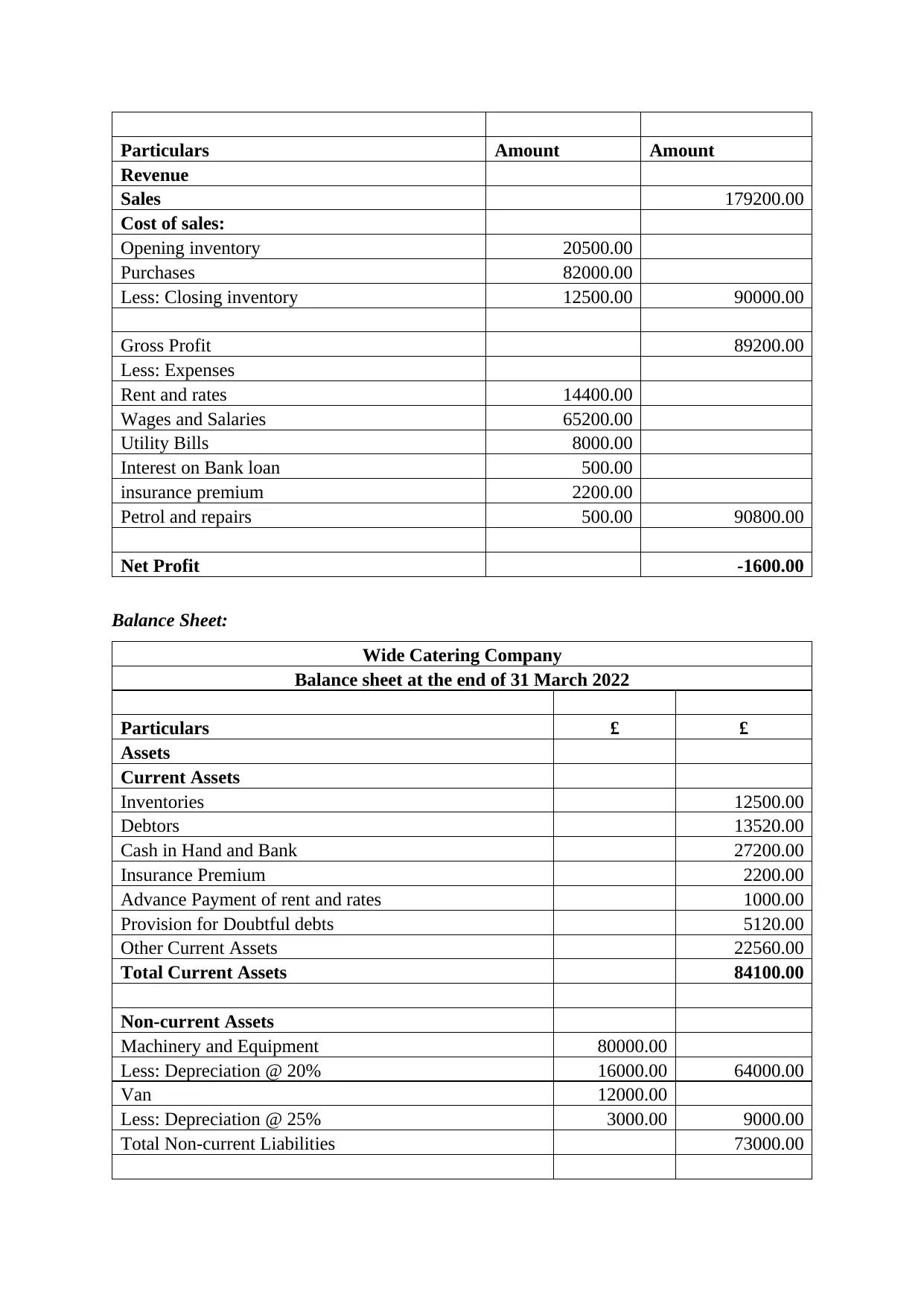
Particulars Amount Amount
Revenue
Sales 179200.00
Cost of sales:
Opening inventory 20500.00
Purchases 82000.00
Less: Closing inventory 12500.00 90000.00
Gross Profit 89200.00
Less: Expenses
Rent and rates 14400.00
Wages and Salaries 65200.00
Utility Bills 8000.00
Interest on Bank loan 500.00
insurance premium 2200.00
Petrol and repairs 500.00 90800.00
Net Profit -1600.00
Balance Sheet:
Wide Catering Company
Balance sheet at the end of 31 March 2022
Particulars £ £
Assets
Current Assets
Inventories 12500.00
Debtors 13520.00
Cash in Hand and Bank 27200.00
Insurance Premium 2200.00
Advance Payment of rent and rates 1000.00
Provision for Doubtful debts 5120.00
Other Current Assets 22560.00
Total Current Assets 84100.00
Non-current Assets
Machinery and Equipment 80000.00
Less: Depreciation @ 20% 16000.00 64000.00
Van 12000.00
Less: Depreciation @ 25% 3000.00 9000.00
Total Non-current Liabilities 73000.00
Revenue
Sales 179200.00
Cost of sales:
Opening inventory 20500.00
Purchases 82000.00
Less: Closing inventory 12500.00 90000.00
Gross Profit 89200.00
Less: Expenses
Rent and rates 14400.00
Wages and Salaries 65200.00
Utility Bills 8000.00
Interest on Bank loan 500.00
insurance premium 2200.00
Petrol and repairs 500.00 90800.00
Net Profit -1600.00
Balance Sheet:
Wide Catering Company
Balance sheet at the end of 31 March 2022
Particulars £ £
Assets
Current Assets
Inventories 12500.00
Debtors 13520.00
Cash in Hand and Bank 27200.00
Insurance Premium 2200.00
Advance Payment of rent and rates 1000.00
Provision for Doubtful debts 5120.00
Other Current Assets 22560.00
Total Current Assets 84100.00
Non-current Assets
Machinery and Equipment 80000.00
Less: Depreciation @ 20% 16000.00 64000.00
Van 12000.00
Less: Depreciation @ 25% 3000.00 9000.00
Total Non-current Liabilities 73000.00
⊘ This is a preview!⊘
Do you want full access?
Subscribe today to unlock all pages.

Trusted by 1+ million students worldwide
1 out of 23
Related Documents
Your All-in-One AI-Powered Toolkit for Academic Success.
+13062052269
info@desklib.com
Available 24*7 on WhatsApp / Email
![[object Object]](/_next/static/media/star-bottom.7253800d.svg)
Unlock your academic potential
Copyright © 2020–2026 A2Z Services. All Rights Reserved. Developed and managed by ZUCOL.




